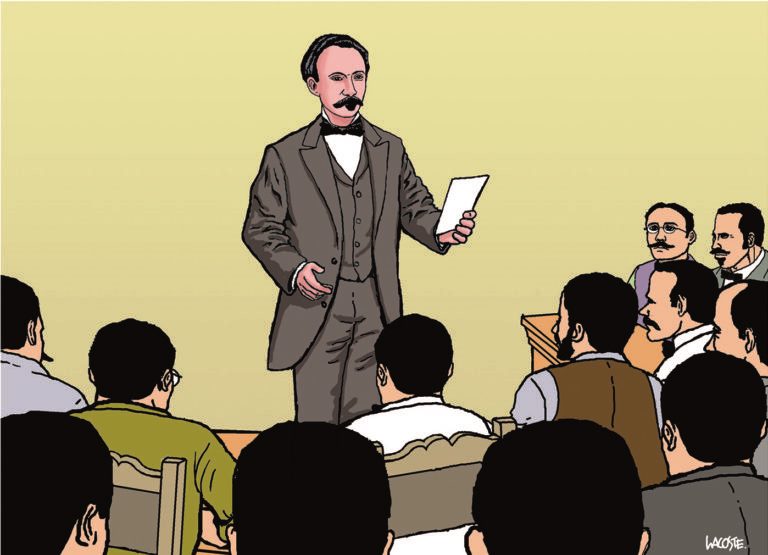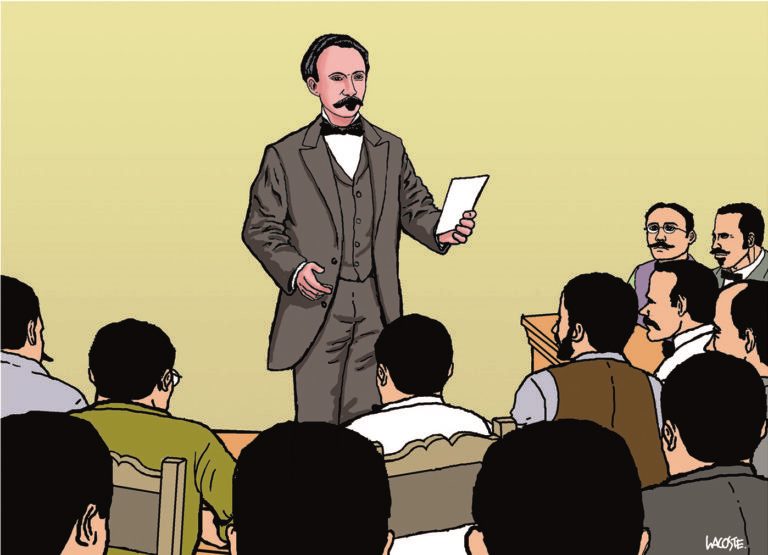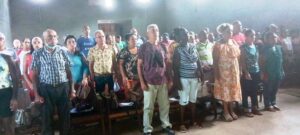Martí and his lessons to workers.

It is said that he would arrive at the classroom between half past nine and ten, after teaching the night class with which he earned his living. He was awaited by an audience of workers, seated in chairs arranged in a semicircle around the teacher’s table.

It is said that he would arrive at the classroom between half past nine and ten, after teaching the night class with which he earned his living. Waiting for him was an audience of workers, seated in chairs arranged in a semicircle around the teacher’s table.
A group of written papers with unsigned questions on the most diverse subjects awaited him. They were the concerns of the disciples converted into the content of each of these sessions, which, because of the variety of subjects they dealt with, came to be described as encyclopedic.
«Manuel J. González, one of those students, narrated about José Martí’s teaching at the Sociedad Protectora de Instrucción La Liga, which was founded in New York in January 1890, where different subjects were taught. It was sustained with the contribution of part of the salaries of the emigrant workers from Cuba and Puerto Rico.
The League became something more than a scenario for acquiring knowledge or recreation, as it happened on Mondays, when the members met to listen to good music, read poetry or talk, according to Alina Martínez, journalist of the weekly Trabajadores.
The creator of the idea, Rafael Serra, considered that it was an organism that forged wills and since it was only a project, Martí valued its importance, welcomed it with enthusiasm, wished it success and asked to collaborate. Thus he wrote to Serra: «I, who do not ask for anything, would have the honor of asking to be useful, really useful in your society, the League or any other, of men and women, where a sincere friend who helps them to look for the truth, or a companion who contributes to propagate it, would not be a bad thing for them».
Gonzalez left a written record of the way in which the Master conducted himself before his listeners: he first read the paper as it was, then he praised the style, if it deserved it, especially if it was written in simple words, without fancy turns of phrase, because he said that in this way the most sublime thoughts could be expressed; he then went on to correct the faults, and such was the delicacy and tact with which he did it that according to the witness «they sometimes felt like committing them, to have the opportunity to hear him correct them» and finally he disserted on the subject.
And about the way in which the Master developed his ideas, he detailed: «It seems to me that I still see him, restless in his chair, as if dominating the dikes of eloquence that wanted to overflow; it seems to me that I see him in the simple relationship, with simple words, on each of the papers written by his humble disciples».
But Martí, in addition to these answers, recommended readings, which were modeling the consciences of the members of the League, organized French classes so that the workers did not have to read translations and the interested in social issues were not forced to seek information in «unwise versions».
In these nightly meetings Martí spoke passionately of Latin America and its heroes, and of the forging of the freedom of Cuba and Puerto Rico. He saw in the League, according to his own words, «The sons of the two islands, that in the stealth of creation, mature the new character by whose justice and firm practice the homeland will be assured».
On the 129th anniversary of his fall in combat, it is worth remembering that it has been said that the New York League, in which Martí served as an educator, was the first link in the revolutionary chain that was being forged under his leadership.
Written by Eva Luna Acosta Armiñán.




